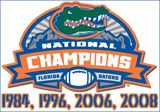ESPN Doesn’t Do Serious Analysis
Or how Demetrius Byrd won the National Championship for LSU
ESPN’s latest issue of “The Mag” has this year’s college preview, and Georgia is their number one team.
I have absolutely no problem with that.
However, I have serious reservations about how they determined the Dawgs would win the BCS title. No, “reservations” isn’t even fair – their “Eliminator” process is downright idiotic.
According to their “statistical wringer”, the past 5 BCS champions have the following in common –
- Have at least 1 receiver with an average of at least 15 yards per catch (30 minimum);
- Recorded 33 or more sacks;
- Passed for more than 3000 yards;
- Allowed less than 20 points per game.
Conceptually, I will agree that, at least the last 3, and most probably the last 2, could be correlated on their face to success.
And, just perhaps, one could cite having a “big play” receiver as causally related to success. But in all (and obvious) likelihood we have an obvious case of data fitting here – or, more simply, the only 4 statistical characteristics the last 5 winners had in common.
ESPN doesn’t stop there. They then take their top 10 teams, and apply their “Eliminator” to each stat, eliminating those that they surmise won’t meet all of their 4 critical criteria. At the end, after deciding that only Georgia will meet all 4 in 2008, they pre-anoint Georgia the BCS title winner.
Where to begin to deal with something so moronic?
First, let’s look at the teams that failed only one of their 4 criteria – USC, Oklahoma, Florida and Ohio State. USC and Oklahoma, according to ESPN, both won’t hold opponents to under 20 points per game in 2008. To which I say – Bullshit. USC held opponents to 16 points per game in 2007, and Oklahoma 20.3. So ESPN is saying USC will be significantly worse on defense, and Oklahoma can’t improve by 0.3 ppg. I’ll take a bet right now that both will be less than 20 ppg defensively by year’s end.
Ohio State is said to be unable to have more than 3000 yards passing. Todd Boeckman had 2379 yards last season, and the team 2565, so they may not.
Lastly Florida is said to be unable to make the 33 sack mark in 2008, though ESPN has UF (somewhat curiously) holding opponents to less than 20 points per game. Last season, with a very green defense, Florida managed 28 sacks. Here’s betting the Gators make at least 33 this year.
Of course giving this analysis to such a fundamentally flawed system is more than it deserves. From a statistical standpoint ESPN’s system is rife with errors, including “false causality”, or the assumption that "A" causes "B". In this case, ESPN wants us to believe that these 4 data points (together “A”) necessarily cause a team to be a champion (“B”). Not to mention that 2 of the statistics – the number of sacks and points per game – are themselves closely correlated, and likely redundant. (For the 30 teams that recorded more than 33 sacks in 2007, their average points per game on defense was 21.97. For the other 89 teams with less than 33 sacks, the average ppg on defense was 28.99.)
To examine what a fine piece of data mining ESPN undertook, I took a look at how many teams met the last 3 criteria in this past season (sacks, 3000 yards passing, less than 20 ppg)– and their were 3. LSU (the MNC), Southern Cal and
Cincinnati.
And in looking at last year’s Bearcats, we see why ESPN choose that “15 yards per catch)” number. They chose it because Cincinnati receiver Marshawn Gilyard came up just short – at 14.9 ypc. So according to ESPN, it was that 0.1 yard Gilyard didn’t have that kept Cincy from great things.
Likewise with USC, whose Fred Davis came up short at 14.2 ypc.
LSU had one receiver who met the criteria – Demetrius Byrd, with a gaudy 17.7 yards per catch. So it wasn’t Doucet and his 57 receptions that made LSU “national champs”, or QB Matt Flynn (he only had 2407 passing, with the rest coming from Perrilloux). According to ESPN, it was Byrd’s 35 receptions that pushed the Tigers over the top to that little crystal trophy.
And just to show how much data fitting ESPN did, the 20 ppg on defense was no accident either – because LSU had 19.9 in 2007. If they had chosen say – 21 ppg, then Boston College and Oklahoma would have slipped under their criteria last season.
Not to mention ESPN only chose “the last 5 years” for their data sample, as it fails quickly when applied to the 2002 “national champion” Ohio State Buckeyes, who passed for only 2425 yards on the season. So passing yards only started being significant since 2003.
What about Georgia last year?
One would think ESPN made their estimations that the Dawgs would win it all based on last year’s evidence a bit, wouldn’t you? Well, apparently not.
The Dawgs had two 15 yard plus receivers in Sean Bailey and Mohamed Masoquoi, and there is no reason to think Masoquoi won’t do it again. And in the sack department, with 42, Georgia should pass the 33.
But last year, Georgia had 20.2 points per game on defense, just shy of the magic 20.
What’s more, Stafford only passed for 2523 yards last season, 19% shy of ESPN’s magic mark. With Moreno on the ground I find it hard to believe he hits 3000 this season.
So, to recap ESPN’s “analysis”, Georgia is going to achieve the 2 of the 4 “critical” stats it failed last season, while USC is going to fail the one it achieved easily? (16.0 ppg).
So this is what the World Wide Leader passes as analysis. Color me unimpressed.





 Mentioned in Austin Murphy's book
Mentioned in Austin Murphy's book 


3 comments:
Great post. Hope "the Schwab" didn't come up with that horseshit.
I knew it! Bearcats for 2008 BCS title! :)
I never cease to be amused at how superior the analysis by bloggers is to that of the folks at SI and ESPN.
Great post. I wonder if the people in Montana feel the same way?
Post a Comment